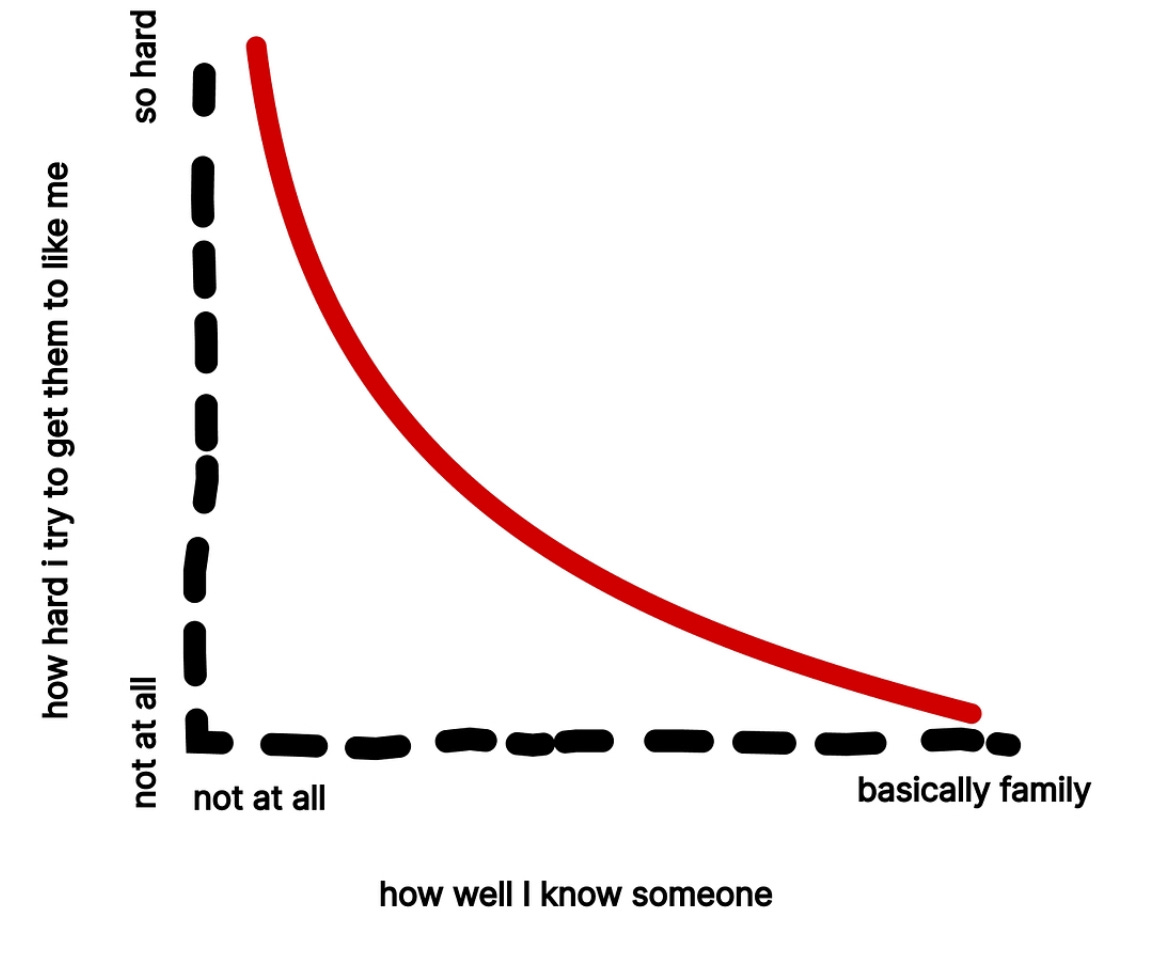On Unconditional Love
Freely Given, Seldom Deserved
The beginning of love is to let those we love be perfectly themselves, and not to twist them to fit our own image. Otherwise we love only the reflection of ourselves we find in them. —Thomas Merton
The greatest happiness of life is the conviction that we are loved—loved for ourselves, or rather, loved in spite of ourselves. —Victor Hugo
Above: Sad, but—if we’re all being honest—often true.
I recently happened upon the above graph and it floored me.
Capital-T Truth works like that; it seldom pulls punches, instead it chooses to sock you in the jaw with a heavy, sweeping hook.
It’s an inconvenient fact: those closest to us—those whom we love most and those who love us most—see the worst of us.
The mother endures the tirade.
The father forgives the prodigal son.
The brother doesn’t turn his back, he opens his arms.
And yet, despite this unearned miracle, the below scene all too often plays out under roofs across the numbing, enervating epoch in which we live:
A (world) weary spouse shuffles home from work, steps over the threshold, beholds his burnt-out, bleary-eyed wife and rambunctious, fickle children, and sighs — seeing burden instead of beauty. Each family member offers a polite, sterile, soulless greeting (if they say anything at all) coupled with nary a touch (let alone a hug or a kiss).
It’s inexcusable and we know it and they know it, yet busyness and ennui seem stronger than wonder and gratitude these days.
Worse, we treat this love as a given, a cheap commodity or Get Out of Jail Free card instead of the jackpot we, the unworthy, have all won.
And yet, it remains, it persists.
Like food coloring in water or ballpoint pen on a white t-shirt, once exposed, it’s there for good. Indelible and suffusive.
He is loved.
She is loved.
They are loved.
We are loved.
And they love and they love and they love and they love.
Such is the uniquely human miracle of unconditional love. Like light, it has brilliant levity, weighed down by neither expectation nor incentive, neither motive nor agenda.
It is a centripetal force, pulling us imperfect humans towards more perfect versions of ourselves; spinning up a virtuous cycle that recognizes truth, promotes good, and amplifies beauty.
It is our spiritual oxygen. We take it for granted, only noticing when it’s in short supply or completely gone. We cannot do anything, go anywhere, be anyone, survive without it.
It is life’s perpetual motion machine—self-sustaining and ever energizing. You give some to get more.
Love given freely sans reciprocity or favor makes the world go round. It is the one force in the universe that challenges mathematics’ durable laws, proving that 1+1 can sometimes equal 3.
Mother Teresa made note of this strange calculus: “I have found the paradox that if I love until it hurts, then there is no hurt, but only more love.”
If you learn one thing today, know you are loved.
If you do one thing today, let others know they are, too.
Per my about page, White Noise is a work of experimentation. I view it as a sort of thinking aloud, a stress testing of my nascent ideas. Through it, I hope to sharpen my opinions against the whetstone of other people’s feedback, commentary, and input.
If you want to discuss any of the ideas or musings mentioned above or have any books, papers, or links that you think would be interesting to share on a future edition of White Noise, please reach out to me by replying to this email or following me on Twitter X.
With sincere gratitude,
Tom



The graph is spot on. So true